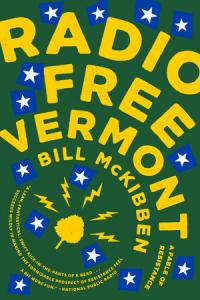
There are two ways to look at the ideas in Bill McKibben’s Radio Free Vermont. The first is that McKibben has gone so far to the Left that he has functionally come full-circle into the Right. The other is that Left and Right still overlap in a few key areas. In either case, this book is a fun and thoughtful read and you should all go out and pick it up.
Vern Barclay didn’t set out to be a revolutionary. At the end of a decades-long radio broadcasting career (for you youngsters out there: ‘radio’ is what people listened to while working before the Internet. You couldn’t pick what was on it, though in many places there were lots of options to choose from), Barclay merely wanted to go out with a mild protest against the opening of a new Walmart in rural Vermont. Due to a series of events largely beyond his control, the protest gets out of control and he gets blamed for the destruction of large amounts of merchandise. On the run, he begins broadcasting pirate podcasts opposing Starbucks in favor of local coffeeshops, opposing Budweiser in favor of local brews, and opposing the national government in favor of a second Vermont republic. (Yes, there was a first one.) Due to a series of bungling missteps by various government officials, the movement takes off and spreads like wildfire, ending [spoiler alert] in a vote by town meetings across Vermont on whether to instruct the state legislature to consider secession.
Clearly to some extent this is outlandish–a “fable,” as the subtitle has it. But as with all good fables, Radio Free Vermont is both a rollicking good story and carries an important lesson: small and local is better. The farther away an institution is, the less it cares about what is actually good for you and me as individuals, and the less concerned it is with not destroying the things that matter most to us.
With that said, McKibben draws back from drawing the really controversial conclusions. Concerned Vermonters ask what will happen to their Social Security and Medicaid if they secede, and are told over and over that they’ll still receive it. Aside from whether or not this is really true (I suspect a state that withdrew from the Union would be cut off from all federal services, though of course it hasn’t happened in a century and a half, so who knows?), if big and distant are bad then the Social Security system and the Medicaid system are going to be vastly worse than anything Walmart can do. Rather than just say we shouldn’t depend so much on them in the first place, the book leaves that implied rather than tackling it directly (other than a brief mention by a supporting character).
Specific policies aside there is something here that should resonate with Christians. We do have a God who is powerful, apart, and above us; but he is not a God who is distant and unconcerned. Where we had separated ourselves from him by our sin, he sent his Son to become a man and reconcile us to him through his own life, death, and resurrection. What’s more, when we are reconciled to God, we are saved individually and then brought into a small, intimate, local institution. The church is not to be some distant, unapproachable, and uncaring institution. It is to be a concerned and intimate body where people know each other and because of that knowledge are better able to care for and serve each other. Small and local is better and, as it happens, Biblical in any case.
So enjoy Radio Free Vermont, and use it as a way to think carefully about politics and as a fable about what Scripture says the church should be.
Dr. Coyle Neal is co-host of the City of Man Podcast and an Assistant Professor of Political Science at Southwest Baptist University in Bolivar, MO













